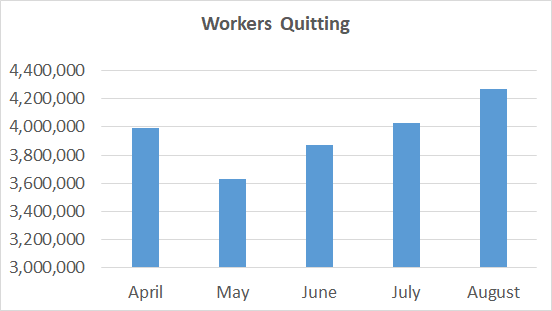With millions of workers quitting bad jobs, and bosses scrambling to find employees, it may be time for workers to organize and strike for union recognition.
Folks are calling it #Striketober for a reason. A lot of union workers are on strike, with large walkouts at John Deere, Kellogg’s, Frontier Communications, and Catholic Health starting just this month, and 60,000 Hollywood workers and tens of thousands of Kaiser Permanente workers have threatened to walk out.
Moreover, millions of workers are quitting their jobs. In August, 4.3 million workers quit, which was 2.9% of the workforce, a record number. This follows other record-setting months of mass quitting, as tracked by the U.S. Bureau of Labor Statistics. The last five months have seen tens of millions of workers quitting, a clear sign that workers are angry and feel they deserve better.

We haven’t seen this kind of turmoil in the workforce in a long time. Employers are scrambling to find employees and have had to raise wages. What should the working class do with the leverage they have?
While it’s understandable for workers to quit bad jobs, they should consider organizing for improvements instead. And one tactic that should absolutely be on the table is the union recognition strike.
A recognition strike happens when non-union workers refuse to work to force their employer to recognize their union and bargain a contract. This is legal and protected activity under the National Labor Relations Act. That generally means workers can’t legally be fired for doing this. It does officially come with some restrictions though, for example, picketing can usually occur for no more than 30 days.
Recognition strikes used to be more common in the past and can be a powerful strategy, but the risks, as with other strikes, are that the employer may try to replace the workers with scabs. Labor law unfortunately allows for the permanent replacement of striking workers. However, if the workers are conducting an Unfair Labor Practice strike, for example, in response to illegal retaliation for organizing, then it’s unlawful for the employer to permanently replace them with scabs.
If this all sounds complicated, it is. What’s the difference between being fired and permanently replaced? Not much. We know labor law isn’t good enough, but there are possibilities here, especially when workers are strong enough collectively, as they are now. Instead of groups of workers quitting their jobs in frustration, they could strike for recognition instead. If they were going to quit, there is literally nothing to lose. For workers who need to stay on the job, but they want better working conditions and treatment, they can carefully organize toward a strike.
Of course a strike, like any organizing tactic, should be carefully planned and prepared. The workers should be solidly organized and ideally have supporters ready to offer solidarity and assistance on the picket line and for a strike fund. Workers can try to get recognition of their own independent union or work with an established union. It’s also possible for workers to strike just for the improvements they want, without getting official union recognition and a contract. In many cases, bosses may offer concessions to entice workers back to work. Workers can take this victory and continue to organize for more.
It’s also useful to have a labor lawyer on hand if needed. There are established steps for workers to get organized and ready for a strike. Labor Notes has a great guide, and if any groups of workers want to talk this through, contact EWOC and let’s discuss!




